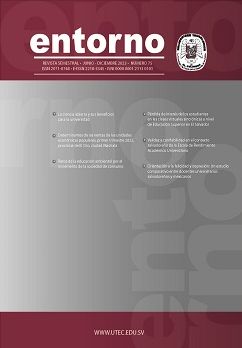Loss of Student Interest in Synchronous Virtual Classes at the Higher Education Level in El Salvador
DOI:
https://doi.org/10.5377/entorno.v1i75.16935Keywords:
Teaching systems, Internet education, Educational innovations, Academic performance, Motivation in educationAbstract
A synchronous online education model can have several benefits. First of all, it allows students to have real-time interactions with their professors and classmates; this can improve the quality of teaching and learning, and students can participate in group discussions and activities more effectively. This interaction can in return enhance their ability to carry out teamwork and be more open to collaborate. This mode of instruction can also be more convenient for students who have busy schedules or live far from their universities. Nonetheless, one of the challenges faced by professors who work online, is the loss of interest that students show in the teaching-learning process. This situation is worrisome since it can have a negative impact on the academic performance of the students; it also decreases their opportunity to graduate.
Given this concern, it is important to understand the contributing causes of the students’ loss of interest in the teaching-learning process of online synchronous classes. These online classes take into consideration the teaching skills, the technological factors, and the study environment of El Salvador’s university students attending institutions located in the metropolitan area of the country, since the coverage, connectivity and quality of internet services is better than in other areas. For the study, a bibliographic review of different authors who are similar to the subject has been carried out, as well as empirical data from a study carried out by the Latin American Technical University (UTLA) has been taken as a reference, in university professors from eight educational institutions. university in El Salvador in 2020, on the impact of the COVID-19 pandemic on non-face-to-face classes and another by the Francisco Gavidia University (UFG), on the problems of virtual education in times of Covid-19, Both studies reflect a series of important findings for this study, which reflects that not only are teachers trained in the use of virtual platforms or technological tools needed, education in virtual ecosystems entails a set of technical, didactic, and pedagogical skills to achieve objective and quality learning.
Revista Entorno No. 75 2023: 25-31
Downloads
438
Downloads
Published
How to Cite
Issue
Section
License
Copyright (c) 2023 Universidad Tecnológica de El Salvador

This work is licensed under a Creative Commons Attribution-NonCommercial-ShareAlike 4.0 International License.
© Entorno
It is required that the authors transfer the right of re-production of their articles to the Entorno Journal

